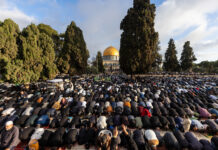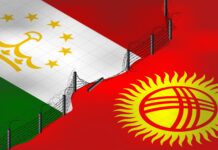Palestinians have universally condemned the Bahraini regime for normalising relations with Israel.
In a demonstration on Saturday organised by Hamas, Gazans burned pictures of Israeli, American, Bahraini, and United Arab Emirates leaders. “We have to fight the virus of normalisation and block all its paths before it succeeds to prevent it from spreading,” said Hamas official Maher al-Holy.
In the West Bank, Secretary-General of the Palestine Liberation Organisation (PLO) Saeb Erekat said the diplomatic push will not achieve peace if the decades-long Israeli-Palestinian conflict is not resolved first.
“The Bahraini, Israeli, American agreement to normalise relations is now part of a bigger package in the region. It isn’t about peace, it is not about relations between countries. We are witnessing an alliance, a military alliance being created in the region,” Erekat said.
Sari Nusseibeh, a former top PLO official, said the Palestinian leadership was “very upset.”
“But I don’t think they are more upset than in the past about the Arab world in general. Palestinians have always complained that the Arab world has not stood behind them as they should have,” said Nusseibeh.
“There have been all kinds of problems in the Arab world – disputes, revolutions, civil wars, tensions between different Arab countries,” said Palestinian analyst Ghassan Khatib. “Palestinians are now paying the price for the deterioration in Arab unity.”
Subscribe to our newsletter and stay updated on the latest news and updates from around the Muslim world!
“We hope that the Arab countries will remain committed to this consensus,” said Jibril Rajoub, a senior Palestinian official, adding straying from it “will lead to nothing”. “Those who are violating the Arab consensus … will be isolated” in the long term, he warned.
Bahrainis opposed to their government’s agreement to establish diplomatic relations with Israel vented their frustration on social media on Saturday. The hashtags #Bahrainis_against_normalisation and #NormalizationIsBetrayal were trending on Twitter after Trump announced the deal late on Friday.
Opposition group Al-Wefaq criticised the normalisation deal. “The agreement between the despotic regime in Bahrain and the Zionist occupation government is a total betrayal of Islam and Arabism and a departure from the Islamic, Arab and national consensus,” it said on Twitter.
Other anti-normalisation groups, based in Bahrain and abroad, expressed their anger in statements sent to media calling the deal “shameful.”
World reaction
Meanwhile, the Turkish Foreign Ministry strongly condemned Bahrain’s decision to establish diplomatic ties with Israel, adding it will deal a fresh blow to efforts to defend the Palestinian cause.
“It will further encourage Israel to continue illegitimate practices towards Palestine and its efforts to make the occupation of Palestinian lands permanent,” the ministry statement said.
In Iran an international Islamic body reiterated Tehran’s outrage at the betrayal.
Ali-Akbar Velayati, who advises Iranian leader Ayatollah Seyyed Ali Khamenei on foreign affairs besides leading the body, said in a statement that the normalisation had served to unmask “the enemies of pure Islam and hypocrites.”
Bahrain’s ruling Al Khalifah regime took the decision towards normalisation by investing “vain hope in the promises of the criminal U.S. regime that is guilty of murdering thousands of Muslims in the region and beyond,” the statement read.
This is while American strategists, it added, had started off the trend of normalisation just to curry favor with the Zionist lobby in the U.S. and secure its vote in the run-up to the U.S.’s elections as well as to save Israel’s politically-embattled prime minister.
The Assembly, meanwhile, called on Arab nations and the international Muslim community to invest in their ability to realise the Palestinian cause and “bring about annihilation and fall of the usurping Zionist regime [of Israel].”
But states allied with Saudi Arabia took the opposite view.
The UAE welcomed the decision by Bahrain and Israel to establish relations, saying that it hoped it would have a positive effect on peace and cooperation in the region and around the world.
“The move represents a significant step towards an era of security and prosperity … (and) would expand the scope of economic, cultural, scientific, and diplomatic avenues of cooperation,” the UAE foreign ministry said in a statement.
On September 15, the UAE will formally normalise ties with Israel, a move that was announced last month. Bahrain and Israel will sign a declaration on the same day.
Egyptian President Abdel Fattah el-Sisi said he appreciated the “important step” Israel and Bahrain had taken in agreeing to establish diplomatic relations.
The agreement would help establish “stability and peace in the Middle East, in a way that achieves a just and permanent settlement of the Palestinian issue,” el-Sisi said on Twitter.
And Oman TV on Sunday said the country welcomes Bahrain’s decision to normalise relations with Israel.
“The Sultanate welcomes the initiative taken by the sisterly kingdom of Bahrain,” the channel said on its Twitter account.
Oman hopes “this new strategic path taken by some Arab countries will contribute to bringing about a peace based on an end to the Israeli occupation of Palestinian lands and on establishing an independent Palestinian state with East Jerusalem as capital,” it added.





















